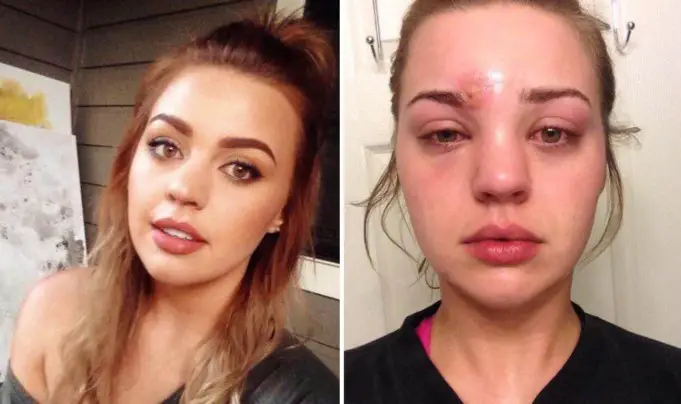Who would think that a simple sharing of an eye brush would cause an infection so bad that it confines you to a wheelchair for the rest of your life! Jo Gilchrist, a 27 year old Australian mother was partially paralyzed because she used a makeup brush belonging to a friend.
A staph infection known as MRSA severely affected her spine, causing intense pain and eventual loss of movement in her limbs. Though her friend had the infection as well, Jo was not immune to it.
Although on the extreme side, the paralysis is just one example of infections caused due to makeup. Sharing makeup brushes is one thing but using expired or low quality makeup can be just as dangerous. As you can imagine, the results are not pretty.
Eyelid swelling
Yes, mascara can sometimes do more than make your eyelashes look fuller. According to the University of Rochester, every year many women are diagnosed with serious eye swelling issues traceable to using old or badly sourced eye makeup.
Fungal growth
This is the ugly side of those pretty looking fake nails if you are not careful. Fingernail fungal infection develops in nails that use low-quality paints and other accessories.
Skin rashes/redness
WebMD quotes an FDA survey showing that at least 25 percent of women have experienced an allergic reaction to beauty products. The reactions range from simple rash to a full-blown visible allergy.
Itchiness and Burning
This could be the most common side-effect of a poorly formulated cosmetic. Skin infections cause redness, itching and acne-like boils that may not leave for months!
Staph/viral infections
Apart from what happened to Jo, there are a range of other viral infections that spread through brushes and other makeup tools. Staph infections can devastate someone with a weak immunity into lifelong immobility.
Permanent blindness
Eyelashes hoard bacteria. And eye brushes sometimes pick these bacteria up and collect them in the makeup container when used carelessly.
This makes your eyes vulnerable to eye infections. Symptoms may start from mild redness all the way to temporary or permanent blindness!
Yep, you could experience all of these because of your makeup products. Want to know how to avoid them?
Use face cleanser before sleeping
NEVER SLEEP WITH MAKEUP ON! There’s lots of gross bacteria that may develop overnight while you’re dreaming of a perfect hair day. Plus, your skin needs time to refresh and your pores need to be able to breathe after a long day.
A layer of foundation over some primer, concealer and eye makeup will not do you any favors when you’re asleep. So use a gentle face cleanser that will wipe away all face products before bedtime. e.l.f.’s face cleansers are great because they’re the cloth type so you don’t have to deal with anything liquid.
Care, don’t share
When it comes to makeup, don’t share. You now know what can happen if you do and nobody wants what happened to Jo Gilchrist to happen again.
Makeup brushes can carry and foster a lot of bacteria when not cleaned properly so don’t use someone else’s and don’t lend yours to anyone.
Lipsticks, lip glosses, lip pencils, mascara, foundation – basically any product that comes into contact with fingers or is left out in the open is off limits if it isn’t yours.
Throw out old makeup
The FDA doesn’t regulate any makeup ingredients (except for dyes). So there’s quite a lot of toxic stuff in your makeup products like lead, mercury and parabens. Add to the mixture some time and moisture and boom!
You end up with stuff like really smelly mascara and powdery, ineffective sunscreen.
It’s dangerous because the bacteria formed over time could cause infections and skin issues. Here are a few estimated “throw away times” for makeup products:
- Mascara – 3 months
- Liquid eyeliner – 6 months
- Concealer, foundation, BB cream – 1 year
- Lip products – 12 to 18 months
- Blush, bronzer, powder – 18 months
Although many products don’t list expiry dates keep a look out for one to be on the safe side. Noting when the product was manufactured can also help you keep track of when to toss it.
Don’t store your products in the bathroom
But why, you say? Bathrooms have lots of moisture and are usually warmer than your bedroom. That’s a perfect environment for bacteria to grow in! So store your liquid products like eyeliner and foundation in colder, drier place like on your bedroom dresser.
Make your routine sanitary
Even if you’re a simple eyeliner and lip gloss gal, make sure you’re applying your makeup safely.
- Clean all application tools – mascara wands, makeup brushes, tweezers andfingers
- BeautySoClean’s Cosmetic Sanitizer Mist is worth checking out
- Wash your face before applying anything
- Never apply makeup on open wounds, scratches or irritated areas
- Put your contact lenses in before applying any makeup
It’s really surprising that a lot of makeup lovers don’t know that makeup infections exist and can be very serious. Fortunately, they can be easily avoided if you practice a clean routine.
An interesting way to learn some more about makeup truths is WebMD’s cosmetics quiz. See how you score and let me know if you’ve got any more tips to avoid makeup infections!












